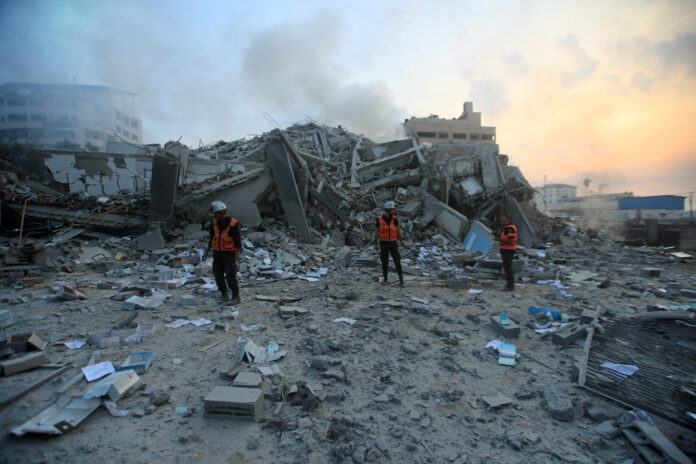
On Monday, a devastating series of Israeli Defense Forces (IDF) airstrikes targeted Hezbollah positions in Lebanon, resulting in over 100 deaths and more than 400 injuries, according to Lebanese health officials. The strikes marked one of the deadliest days in nearly a year of escalating hostilities between Israel and Hezbollah, fueling fears of a full-blown conflict that could have severe consequences for the broader Middle East region.
The Israeli military confirmed it had launched around 300 strikes against Hezbollah targets in southern Lebanon. In a statement released via the social media platform X (formerly Twitter), the IDF shared a picture of its military chief, Lt. Gen. Herzi Halevi, authorizing further attacks from a secure underground operations center in Tel Aviv. “The Chief of the General Staff approves strikes on Hezbollah targets in Lebanon from the IDF Headquarters Underground Operations Center. So far, more than 300 Hezbollah targets have been struck today,” the post stated.
Lebanon’s health ministry reported that women, children, and medical personnel were among the casualties. The ministry also urged hospitals in the south and east of Lebanon to cease all non-essential surgeries to accommodate the influx of wounded victims, emphasizing the need to make space for those critically injured by the Israeli attacks. The health system, already strained by years of conflict and economic hardship, is now facing one of its most severe crises in recent memory.
Hezbollah, the powerful Shiite militant group backed by Iran, retaliated with strikes on Israeli military positions, further intensifying the cross-border violence. In a statement, Hezbollah claimed responsibility for bombing two Israeli military positions in northern Israel and targeting the Rafael defense industry complex near the city of Haifa. These strikes, the group said, were in direct response to Israel’s relentless bombing of southern and eastern Lebanon, including Hezbollah-controlled areas in the Bekaa Valley.
As tensions between Israel and Hezbollah escalate, regional leaders have called for urgent international intervention. Iraq’s top Shiite cleric, Grand Ayatollah Ali Sistani, issued a statement condemning Israel’s actions, describing them as “barbaric aggression.” Sistani urged the international community to do everything possible to stop the bloodshed and protect the Lebanese people from further harm.
“The ongoing Israeli aggression on Lebanon is a war of extermination in every sense of the word,” Lebanese Prime Minister Najib Mikati declared during a cabinet meeting held amid the ongoing airstrikes. He warned that Israel’s military campaign aims to destroy Lebanon’s villages and infrastructure, leaving the country in ruins. Mikati called on the United Nations, the General Assembly, and influential global powers to intervene immediately to stop what he described as a “destructive plan.”
The conflict has drawn widespread concern from various international bodies, with calls for de-escalation growing louder. However, despite these pleas, Israeli Defense Minister Yoav Gallant has signaled that more strikes are imminent. Following a meeting with defense officials to assess Israel’s readiness on the home front, Gallant urged the Israeli public to prepare for difficult days ahead. “Ahead of us are days when the public will have to show composure, discipline, and full obedience to instructions from the Home Front Command,” Gallant told reporters, hinting that the conflict could worsen before any resolution is reached.
The IDF has also issued warnings to Lebanese civilians living in or near Hezbollah-controlled areas, urging them to evacuate. Rear Admiral Daniel Hagari, a military spokesperson, reiterated Israel’s stance that civilians should distance themselves from Hezbollah’s military facilities for their own safety. “We advise civilians from Lebanese villages located in and next to buildings and areas used by Hezbollah for military purposes, such as those used to store weapons, to immediately move out of harm’s way,” Hagari said during a media briefing. This warning reflects Israel’s determination to target Hezbollah’s military infrastructure while attempting to minimize civilian casualties.
However, critics argue that the large-scale strikes on densely populated areas in southern Lebanon make civilian casualties inevitable. Hezbollah, deeply embedded in Lebanese society, controls large portions of the south and Bekaa Valley, where many of its military assets are reportedly hidden among civilian infrastructure. These circumstances complicate the military engagement, raising the risks of a humanitarian catastrophe if the conflict continues to spiral out of control.
The current wave of violence comes against the backdrop of a fragile situation in Lebanon, a country already grappling with the aftermath of a severe economic crisis, political instability, and the lingering effects of the COVID-19 pandemic. For many in Lebanon, the renewed conflict with Israel threatens to deepen the suffering that has plagued the nation in recent years, leading to concerns of mass displacement and further destruction of vital infrastructure.
The airstrikes and retaliatory attacks have also heightened the prospect of a broader regional conflict, as Hezbollah enjoys the support of Iran, while Israel has a robust military alliance with the United States. Any further escalation could draw these global powers more directly into the fray, creating a volatile and unpredictable situation that could engulf neighboring countries.
The international community remains on high alert, with diplomats from across the world working to prevent the conflict from spreading. But with each passing day, the prospect of a negotiated ceasefire seems increasingly remote. Both Israel and Hezbollah appear to be entrenched in their positions, unwilling to back down as the stakes continue to rise.
As the situation unfolds, the people of Lebanon and northern Israel remain trapped in the crossfire of a conflict that shows no signs of abating. For now, the region watches and waits, hoping for an end to the violence that has already claimed too many lives.
